- Home
- Karen Hesse
A Light in the Storm Page 2
A Light in the Storm Read online
Page 2
Thursday, December 27, 1860
Fair. Wind S.W. High.
Inspection at 2:30 P.M. Condition very good.
No time to write yesterday. Today the Inspector from the Lighthouse Board came. He made no complaint against our work. He declared the Lighthouse trim and tidy, though he recommended a fresh coat of paint come spring. The salt, sand, and wind have been unusually hard on the buildings.
He was so pleased with our care of the station, remarking on the condition of the brass, on the polish of the glass. With his compliments coming so freely, he took us all by surprise at the very end of his inspection when he spoke unkindly of me.
He said Father and Keeper Dunne should alter their watches to eliminate the need for mine. He said I should not be standing watch over the Light. “She is little more than a child. And a female, at that. How can she make decisions in time of emergency?”
My temper sparked. How dare he question my ability? It is Father’s opinion that in this year alone at least three men would have drowned but for my actions. I wear a scar across my cheek from rescuing William Worthington the September before last, when I was fourteen. Yet it would do me no good to show my anger to Inspector Howle.
Father defended me. He told Inspector Howle of my position as Assistant Teacher at the Bayville School. “She has been teaching two years,” Father said. “If her work here at the Light does not demonstrate her reliability to you, contact Mr. Warner. Let him speak for her.”
The Inspector looked into my face. I wished I could make the freckles across my nose disappear. Wished I could slim the lines of my cheeks, round as a baby’s bottom.
Inspector Howle said if I was in service as an assistant teacher, then I must have enough to keep me occupied without the additional work of a Light station. How could I possibly get enough sleep standing five-hour watches?
“My work at school ends at one in the afternoon,” I told him. “I am always back here in time to take first watch. I begin at four, finish at nine. I get by well.”
The Inspector stared at Father disapprovingly. “You have raised your daughter to contradict a representative of the United States Lighthouse Board?”
Father put his hands on his hips and looked the Inspector directly in the eye. “I’ve raised my daughter to be honest, Inspector Howle. A quality the Board values highly, if I am not mistaken.”
I do not overlook a single task, from the filling of the oil wells to the polishing of the doorknobs. Not a speck of dust do I leave. There isn’t a single situation for which the Lightkeeping manual does not give step-by-step instructions, and since we came here nearly one and a half years ago, I have read from that manual as often as the tide has turned. If I drop oil on a lens, I clean it with spirits of wine. I know precisely how to trim a wick and adjust a flame. Precisely.
I don’t ask for pay for my work. Nor even acknowledgment. I simply ask to be allowed to attend the Light. It is enough for me to know that by my actions, men are guided safely to port. I am good at my Lighthouse duties. I should continue.
When he left, Inspector Howle did not cite us for one single thing. Nor, in the end, did he instruct Keeper Dunne to relieve me of my watches.
So I am allowed to continue, unofficially, as assistant to the Assistant and Head Lightkeepers.
Inspector Howle shall see. In time I shall show the entire United States Lighthouse Board. I can keep the Light as well as anyone. And someday, I shall be given a Light of my own.
Friday, December 28, 1860
Clear. Wind N.W. High.
Cold has set in early. The millpond in Bayville is frozen over and William has started skating upon it, though I have yet to find time to join him.
A skin of ice borders the edges of Fenwick Ditch, making my daily trips to and from the mainland more difficult.
If the Ditch freezes fully over this winter, I shall walk across the water from island to mainland and back again. Mother would shackle me if she caught me. But wouldn’t it be fine to do such a thing!
Crossed the Ditch this afternoon to pick up supplies in Bayville and see to Grandmother.
On my way to her cottage, I passed some men who were drinking in the street. One chased after me. I ran from him, my skirts hiked up. He didn’t stand a chance of catching me. Even in my skirts and cloak I run faster than most boys. I thought first of running to Uncle Edward, but made Grandmother’s in less time.
Didn’t dare tell Grandmother what had happened. The man who had chased me came puffing past her window several minutes later, shouting drunkenly. He seemed already to have forgotten me. I asked if Grandmother knew the cause of the man’s midday revelries.
Grandmother said three Negroes were hanged earlier today in the jail yard. At one o’clock. Just an hour before I passed.
After I did the washing up and the ironing, brought in wood and cleaned out the ashes, Grandmother asked me to sit and visit awhile. She asked after Mother. I told her about the inspection and how Mother and I received excellent scores on our housekeeping, and Father and Keeper Dunne and I on the accuracy of our logs.
Grandmother wanted to know if Father was treating Mother well.
I struggled to keep from losing my temper.
Grandmother said, “The captain of a vessel shall be not governed by his mate. But a married landsman shall.” She said Father was not captain of his vessel anymore and he should remember that.
Grandmother is angry because Mother is too busy to come ashore often. But she is also still furious with Father. Five years ago, Father was stripped of command of his ship.
He knowingly broke the law by transporting north the leader of a slave rebellion. When the rebel slave was discovered on Father’s ship, Father lost everything.
I was so young when it happened, only ten. But I remember feeling shame. I managed at last to put it out of mind. That’s where it stayed until last year when we plucked the family of fugitive slaves from the sea and the whole question rose up again.
After washing up from tea, banking Grandmother’s fire, and preparing a light meal for her dinner, I ran all the way to Uncle Edward’s store. Uncle listened to my talk about the executed Negroes.
“That’s the way it is here in Sussex County, Wickie.”
Now, on watch, I remember again the fugitive slaves we rescued. Remember the expression on the children’s faces as the slave catchers took them away.
Were they hanged, too?
Monday, December 31, 1860
Stormy. Wind S.W. Moderate.
Hard weather the last few days. No time to write. Today Napoleon followed me along the high tide line as I collected driftwood. Mother and Father argued again.
Napoleon keeps very close at my heels lately. He was waiting for me, outside the Lighthouse, when I came for my watch. Brought him up the stairs and dried his wet fur in my apron before Father and Keeper Dunne arrived to help me kindle the Light. This dark and stormy evening, I feel so deeply alone. Napoleon is even more a comfort in his own way than you, my diary, particularly as I read over the poem Uncle Edward placed in the beginning, particularly in view of the news he gave me today.
Uncle Edward heard that South Carolina voted to leave the Union! A state can’t just stop being part of our country anytime it pleases!
Napoleon keeps nosing under my hand as I write, making me smudge my letters. He is purring and needling my lap with his claws. Outside the storm blows, whistling around the Lighthouse. The tower sways, buffeted by high winds. But Napoleon, at least, is happy for the moment.
I wish I could be happy. I wish Uncle Edward was wrong about South Carolina. But Uncle Edward is seldom wrong about anything.
Thursday, January 3, 1861
Rain and Fog. Wind S.W. Fresh.
Won’t make excuses. Some days I simply cannot write. Enough said.
This morning, Father and I left the station at 9 A.M., heading for Frankford on our big expedition to buy monthly supplies of flour, sugar, coffee, and the like.
In Frankford
, the talk was everywhere about South Carolina. It alarmed me to hear the pleasure taken by so many at the idea of secession. Our country’s history has been my fascination since I was small. I know at what sacrifice our nation was born. To consider undoing the country over the issue of slavery and where it shall be permitted is unthinkable.
Saw Mr. Warner in Frankford. At least he spoke of something other than secession. He spoke of the new school term beginning next week. “I’ve heard from several parents that their children miss you,” Mr. Warner said. “And I miss you too, Miss Martin. Did your uncle like his book?”
I told him how much Uncle Edward was enjoying Darwin. Mr. Warner said he had a book for me to read. Fifteen Decisive Battles of the World by Edward Shepherd Creasy. I shall have it when school resumes.
I am eager to return to my post as Assistant Teacher at the Bayville School. I miss the children very much.
Father and I returned across the Ditch just in time for my watch. Keeper Dunne had already begun preparations to kindle the Light. Because we returned from Frankford so late, I missed dinner. Father brought a basket from Mother out to me. I listened, with pleasure, to his steady steps climbing the spiral stair.
Now, with Father back at the house, sleeping, I eat my cold pork and biscuits, alone, gazing out to sea. As the light sweeps across the dark, I strain my eyes, watching. I have just you, my diary, for company tonight. And I’m afraid I have made a grease stain on you.
Monday, January 7, 1861
Clear. Wind S.E. Moderate.
Helped Mother with breakfast chores, then joined Father and Keeper Dunne in the Light. Cleaned soot from the lantern, trimmed wicks, and polished brasswork before heading across the Ditch for school.
The current swept me down channel, but finally I made my way across.
Reenie O’Connell and my young Osbourne scholars joined me on the path. Bayville School is not much to look at. A low, unpainted building furnished with double seats, a single blackboard, a woodstove, and Mr. Warner’s desk. The boys tend the woodstove, each bringing a stick with them in the morning. Even little Jacky Osbourne carries a chunk of firewood for the stove.
I wish I could speak with someone at school about all the matters troubling me. William is no longer a student. Both he and Daniel work now. But even if William came to school, lately, as I question slavery more and more, William gets thorny with me and I with him.
I wish I could speak with Reenie, but I can’t. Reenie’s father sides with the secessionists. Her family has no love for Abraham Lincoln.
Today I began my third year as pupil teacher, assisting Mr. Warner. Mr. Warner says I should continue my studies at the University next year. He says I would make a very good teacher.
I haven’t mentioned Mr. Warner’s idea to Father or Mother. I’d very much like the opportunity to learn more about history and teaching, but I have no wish to leave Fenwick Island.
After school, I took care of Grandmother’s chores. She has begun making a list for me each day and the lists get longer and longer with every visit. It’s confounding. She generally can’t abide having me in the same room. I’m a big and muscled girl, not at all the dainty lady she’d wished for in a granddaughter.
I finally broke free of Grandmother and visited Uncle Edward but I had only a few minutes before heading back to the Light. We discussed Mr. Darwin’s book and I showed Uncle the Fifteen Decisive Battles from Mr. Warner.
I felt I must talk with Uncle Edward and give voice to the trouble in my heart.
Uncle called for Daisy to look after things and took me aside. Last year, Daisy was Reenie O’Connell’s house slave. Uncle Edward bought her from the O’Connells, then freed her. Daisy stayed on to work for Uncle Edward. She could go as a free woman wherever she pleased, but she pleased to stay at Uncle Edward’s store, sleeping downstairs in a room she fixed herself.
Uncle Edward frowned under his smart mustaches. “What is it, Wickie?”
“South Carolina leaving the Union,” I told him. “I’m frightened.”
Uncle Edward’s eyes showed understanding. “I’m a little frightened, too, Amelia.” He stretched his good hand over the top of mine. His withered hand hung at his side.
I stopped at the church for one moment before rowing home. The ropes of evergreens from Christmas still hang along the galleries. Knelt and prayed, for the preservation of our country and for the preservation of my parents’ marriage.
And now I stand watch. I’ve been tracking the lights from a small ship heading south. Have made note of its progress in the log.
I wonder if there are any corn cakes left from dinner. I am hungry.
Thursday, January 10, 1861
Clear. Wind N.W. Moderate.
Oh, my diary, Uncle Edward gave me the most horrible news today. Three drowning deaths. Children venturing on ice not thick enough to support their weight. The first two deaths were my scholars, Winfield Pearce, six years old, and John Moore, eight. The boys died last night, together. I knew of their deaths already, before Uncle Edward told me. Children at school could speak of nothing else. The boys fell through the ice at Churchman’s Pond. I am bereft to lose those little boys.
Yet, the third death Uncle Edward revealed to me tore truly through my heart. William Worthington, my William, drowned in Sharp’s Millpond last night.
I couldn’t believe it when he first told me. Surely if such a thing had happened I would have known.
“William was skating at the head of the pond,” Uncle Edward said. “He ventured too far out, where the ice was still thin. He broke through and drowned before Daniel could reach him. I’m sorry, Amelia. I know you were friends.”
Friends! Oh, much more than friends.
I sat with Uncle Edward. I could only think of the way William unwrapped his bread from its cloth before he ate, and the smell of the woods the day we went out gathering chestnuts, and how William’s eyes widened when I told him about storms at the Lighthouse. How we argued about stupid things. How alive he was. Oh, how will it be without William?
Uncle put his arm around my shoulder.
“I should go see Mrs. Worthington, and Daniel, and the little girls.” But I couldn’t make myself move.
William had asked me to come skating with him. If I had been there he would still be alive. I would have kept him from the thin ice, I would have kept him from falling through. But even as I thought it, I knew it wasn’t true. William was stubborn. He went where he pleased. I couldn’t have stopped him any more than Daniel could have.
Uncle Edward said, “Wickie, we should take a holiday. Just the two of us. Professor Armes is speaking in Smyrna this weekend.” I tried paying attention but I could only think of William.
I told Uncle Edward no. I could not leave my school chores, I could not leave my Light chores. I could not walk away from William Worthington.
I rowed back to the island. Napoleon greeted me as I pulled the skiff to the boathouse. I walked along the strand, holding Napoleon against me.
Oda Lee Monkton appeared suddenly on the beach, her arms crossed at her chest, her short hair sun-streaked and wind-tossed. I was close enough to see the puffiness under her eyes, her face with its four deep lines, two connecting her nose to her mouth, two connecting her mouth to her chin. She was close enough to see my tear-streaked face.
Napoleon, startled by Oda Lee’s sudden appearance, paddled free of my arms and ran through the dune grass.
I ran, too.
Back to the house. I found Mother upstairs, sewing in the front room, a blanket over her lap, her long hair spilling across her shoulders. Father sat carving in his corner.
“What is it, Amelia?” Mother asked the moment she saw me. “What’s wrong?”
I was too upset to talk.
“Come with me,” she said.
I followed her to her bedroom. She lightly touched my face. It was enough to open the door on my sorrow.
When I returned to the front room, Father was preparing to take my watch. “I c
an manage,” I told him. We headed down together.
Light spilled pink across our faces, the pink of sunset. Wrapping my cloak around my shoulders, I raised my hood for the short walk to the Light. Father and I climbed the Lighthouse steps together, joining Keeper Dunne in the lantern room, where we lit the wicks. Keeper Dunne pulled the chain until it hung at its longest, down through the center of the stairs, then started the clockwork. The heavy Light began to turn, floating on its greased base.
As if this were any night, the Light began its nightly circle of darkness and flash.
Keeper Dunne returned to the house. Father and I descended one flight below, to the watch-room. We stepped onto the balcony, the wind snapping at our cloaks. In the twilight, we watched a ship steam past several miles out. No doubt the captain took comfort in the flash of our Light.
Father nodded to the distant ship. “Safe passage,” he whispered.
I thought of William. Safe passage, I prayed.
Friday, January 11, 1861
Rain. Wind N.E. Light.
Buried William Worthington.
Thursday, January 17, 1861
Cloudy. Wind N.W. Moderate.
Visited Uncle Edward after school. There was an earthquake in South Carolina! The quake sent people running into the streets. They thought their houses were falling down.
Uncle Edward said their houses were falling down, from a different kind of earthquake altogether. “For pity’s sake, the very house of America is falling down because of their actions.”
Mr. O’Connell was in Uncle Edward’s store testing the weight of hoes, close enough to hear Uncle Edward’s words. Mr. O’Connell still treats Daisy like a slave. She works in back when Reenie’s father comes in. After hearing us speak out against South Carolina, Mr. O’Connell pitched the hoe he’d been favoring back against the wall. He left without buying a thing.

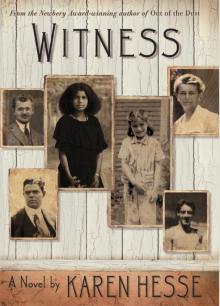 Witness
Witness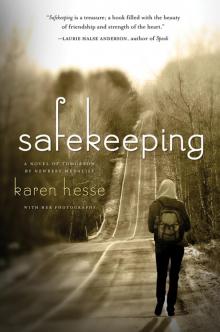 Safekeeping
Safekeeping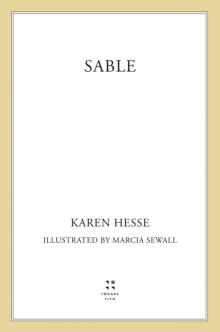 Sable
Sable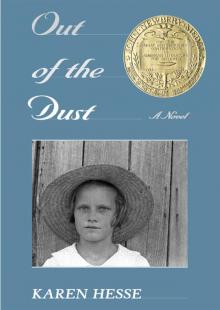 Out of the Dust
Out of the Dust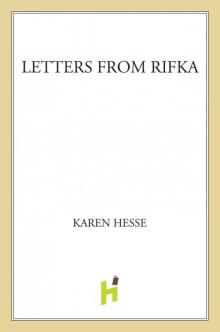 Letters From Rifka
Letters From Rifka The Music of Dolphins
The Music of Dolphins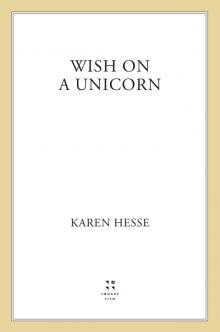 Wish on a Unicorn
Wish on a Unicorn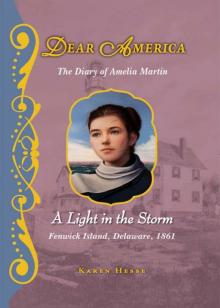 A Light in the Storm
A Light in the Storm